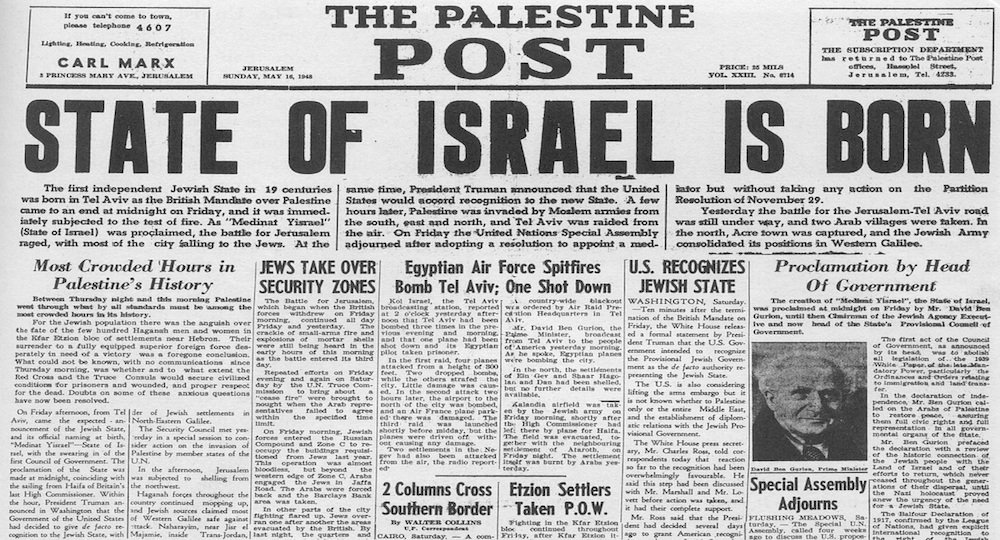For years, Arab-Palestinian advocates have worked to diminish importance of the November 1917 Balfour Declaration, where the British Government declared its support for “a national home for the Jewish people,” going as far as taking legal action against United Kingdom for issuing the declaration. Back in 2016, in Mauritania, then-Palestinian Authority’s Foreign Minister Riyad al-Malki told Arab League leaders that London is to blame for all “Israeli crimes” committed since the end of the British Mandate in 1948.
In al-Malki’s telling, when Balfour signed the Declaration in 1917, it was seen by the Arabs as giving the Zionist movement official recognition on the eve of the British conquest of Ottoman Turkish Palestine. The decision, al-Malki said, “gave people who don’t belong there something that wasn’t theirs.”
Given these misrepresentations, it is worth framing the historical conversation on the document with the use of firsthand observers.
Bartley Crum, a left-wing Roman Catholic civil-rights lawyer, in his personal account of Anglo-American diplomacy entitled, Behind the Silken Curtain addresses the meaning of the phrase “Jewish State” as it related to the Balfour Declaration. Crum was a member of the Anglo-American Committee of Inquiry, established in 1946 and tasked to examine political, economic and social conditions in Mandatory Palestine. Crum in this personal account writes tellingly that:
The words “Jewish state” were a source of constant difficulty for the committee. There was no doubt in our minds that the intention of the Balfour Declaration and the mandate was to enable the Jews to make Palestine a country which would be predominantly Jewish—a Jewish National Home to which Jews could go as right and not on sufferance. This meant, as Lloyd George put it, that if the Jews ultimately constituted a majority there, then and only then—the purpose of the mandate would be achieved … [further] we rejected the narrow, almost sinister interpretation of a “Jewish state” as a chauvinistic or racial state, in which only Jews could be first-class citizens and only Jews could hold office. This was the meaning placed upon the words by the Arabs and by Lessing Rosenwald and the American Council for Judaism.
Fast-forward, the British-born Israeli statesman Abba Eban described a personal connection to the Balfour Declaration involving his family when his mother in November 1917 “obeyed a nocturnal call from the Zionist leaders to leave my cradle and go to the office on a foggy night to translate the Balfour Declaration into French and Russian. It was a sensational document because, in promising the Jewish people a national home in Palestine, it took the Jews, for the first time since antiquity, into the world of politics and law. It deserves to be acknowledged to this day as the authentic starting point of the process that led to the State of Israel. The translation of a document sounds a modest chore, but it linked my family to an unforgettable drama.”
The uniqueness and force of the Balfour Declaration are grounded in the political understanding that Jews are indeed a nation. Zionism is thus Jewish nationalism in its purest form. But while the successes of Zionism are easily pointed to on the calendar, it’s difficult to pinpoint a specific date for the origin of Palestinian nationalism. It developed during the early 20th century simultaneously with other ideologies and identities, including a generalized pan-Arab nationalism based on shared Arabic language and culture; the nationalism of various Arab states such as Iraq and Egypt; and various versions of political Islam. However, most scholars acknowledge the leadership of the British appointed “Grand Mufti” of Jerusalem, Haj Amin el-Husseini, whose open and close ties to Adolf Hitler remain an important topic of debate, as the effective beginning of Palestinian identity and its rejectionist narrative.
Balfour is yet another historical touchstone for the historical revisionism that fuels the highly charged tone of the Israeli-Palestinian conflict. It causes the question of Palestinian independence to be viewed through a prism of mutually exclusive political and ideological narratives, not only between the two sides but also within each community.
Asaf Romirowsky is executive director of Scholars for Peace in the Middle East (SPME) and a senior non-resident fellow at the Begin-Sadat Center for Strategic Studies (BESA).


























